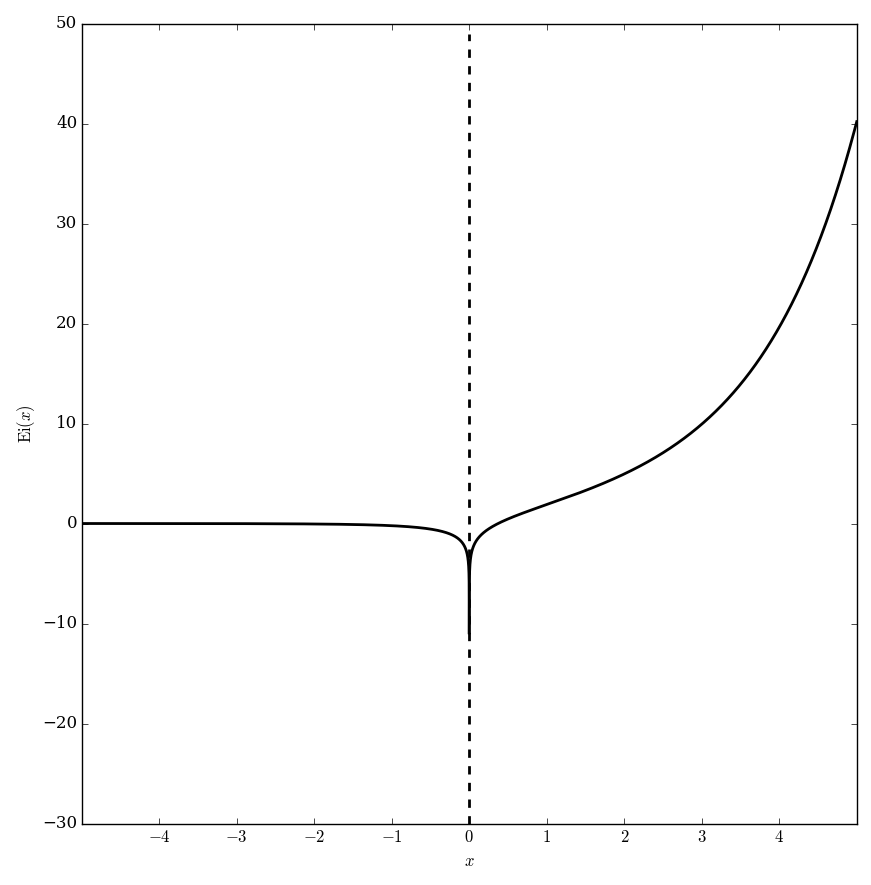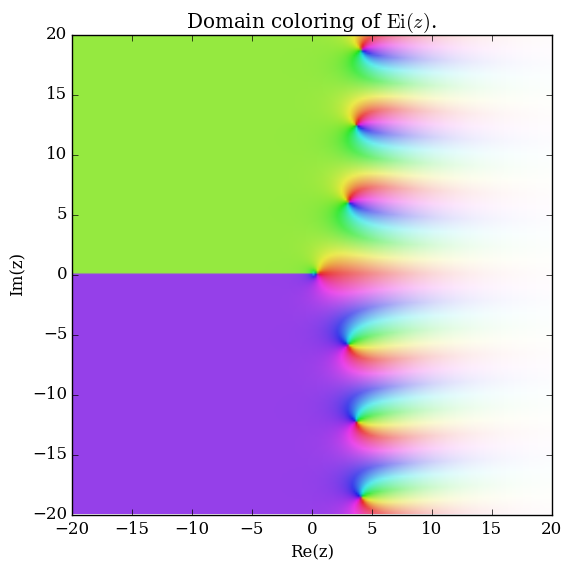Difference between revisions of "Exponential integral Ei"
From specialfunctionswiki
| (5 intermediate revisions by the same user not shown) | |||
| Line 1: | Line 1: | ||
The exponential integral $\mathrm{Ei}$ is defined for $x>0$ by | The exponential integral $\mathrm{Ei}$ is defined for $x>0$ by | ||
| − | $$\mathrm{Ei}(x) = \int_{-\infty}^x \dfrac{e^t}{t} \mathrm{d}t | + | $$\mathrm{Ei}(x) = \mathrm{PV}\int_{-\infty}^x \dfrac{e^t}{t} \mathrm{d}t,$$ |
| + | where $\mathrm{PV}$ denotes the [[Cauchy principal value]] and $e^t$ denotes the [[exponential]]. | ||
| Line 11: | Line 12: | ||
=Properties= | =Properties= | ||
| − | [[ | + | [[Ei(-x)=-Integral from -x to infinity of e^(-t)/t dt]]<br /> |
[[Relationship between logarithmic integral and exponential integral]]<br /> | [[Relationship between logarithmic integral and exponential integral]]<br /> | ||
[[Exponential integral Ei series]]<br /> | [[Exponential integral Ei series]]<br /> | ||
| Line 20: | Line 21: | ||
=References= | =References= | ||
| − | * {{PaperReference|On certain definite integrals involving the exponential-integral|1881|James Whitbread Lee Glaisher|next= | + | * {{PaperReference|On certain definite integrals involving the exponential-integral|1881|James Whitbread Lee Glaisher|next=Ei(-x)=-Integral from x to infinity of e^(-t)/t dt}} |
| − | * {{BookReference|Handbook of mathematical functions|1964|Milton Abramowitz|author2=Irene A. Stegun|prev= | + | * {{BookReference|Handbook of mathematical functions|1964|Milton Abramowitz|author2=Irene A. Stegun|prev=Ei(-x)=-Integral from -x to infinity of e^(-t)/t dt|next=Logarithmic integral}}: $5.1.2$ |
| − | |||
{{:*-integral functions footer}} | {{:*-integral functions footer}} | ||
[[Category:SpecialFunction]] | [[Category:SpecialFunction]] | ||
Latest revision as of 00:48, 24 March 2018
The exponential integral $\mathrm{Ei}$ is defined for $x>0$ by $$\mathrm{Ei}(x) = \mathrm{PV}\int_{-\infty}^x \dfrac{e^t}{t} \mathrm{d}t,$$ where $\mathrm{PV}$ denotes the Cauchy principal value and $e^t$ denotes the exponential.
Properties
Ei(-x)=-Integral from -x to infinity of e^(-t)/t dt
Relationship between logarithmic integral and exponential integral
Exponential integral Ei series
Relationship between exponential integral Ei, cosine integral, and sine integral
See Also
References
- James Whitbread Lee Glaisher: On certain definite integrals involving the exponential-integral (1881)... (next)
- 1964: Milton Abramowitz and Irene A. Stegun: Handbook of mathematical functions ... (previous) ... (next): $5.1.2$

